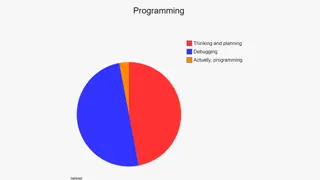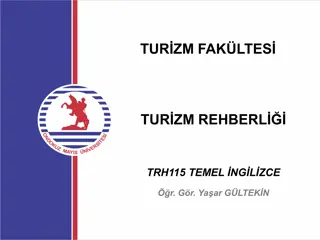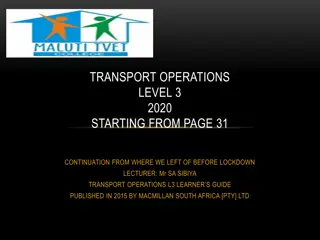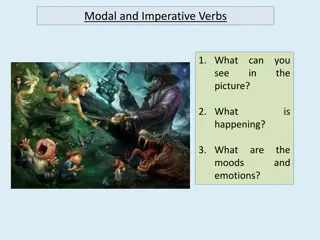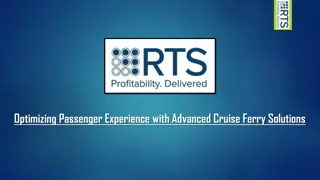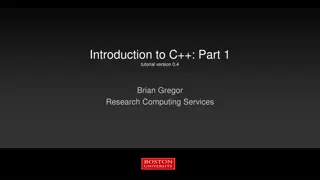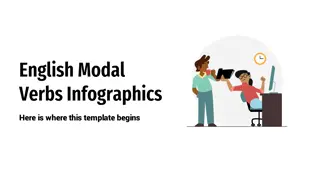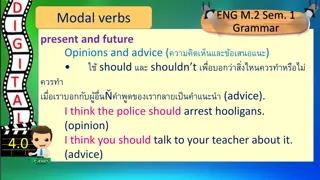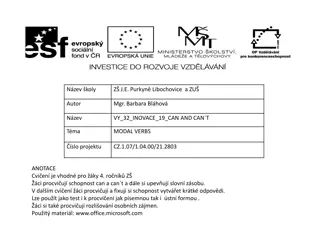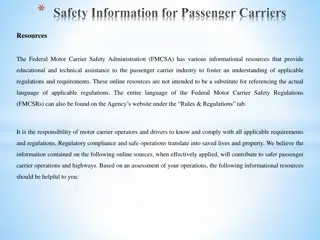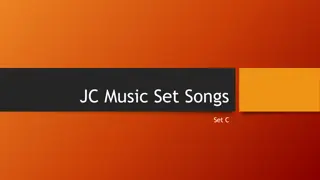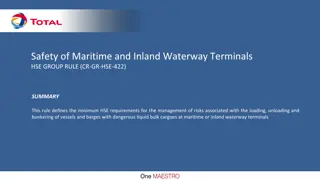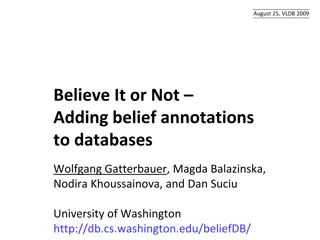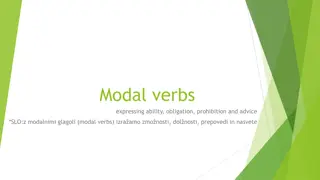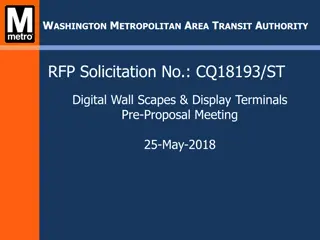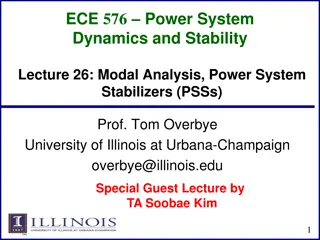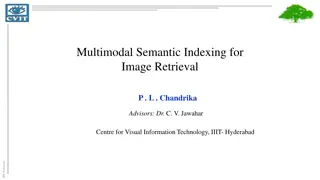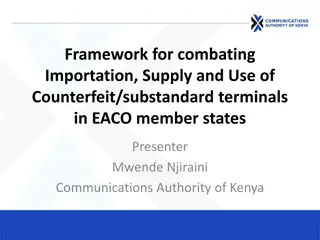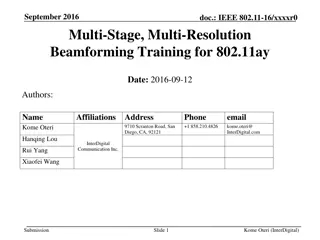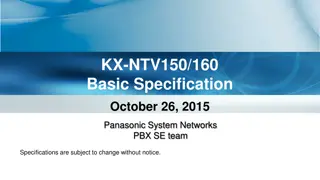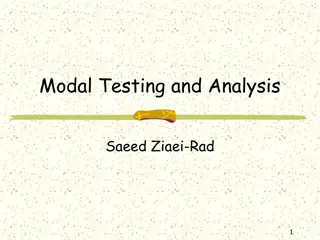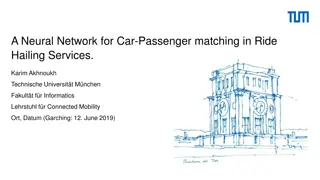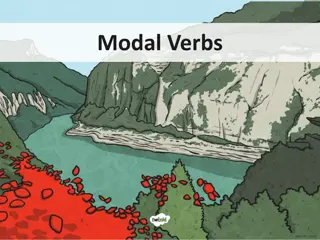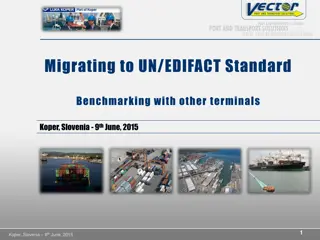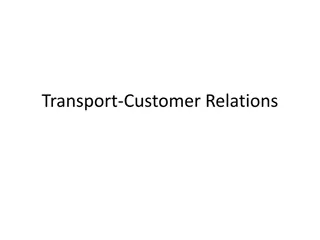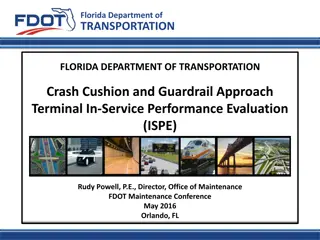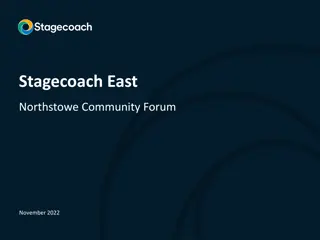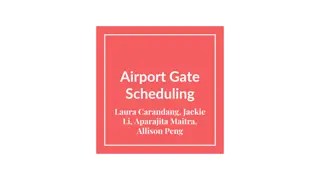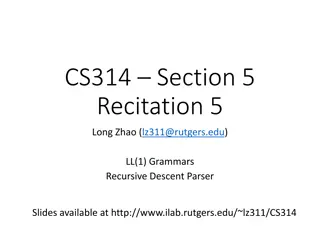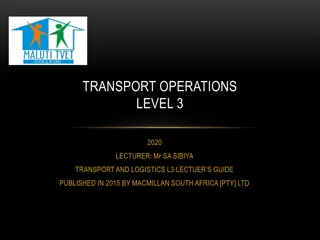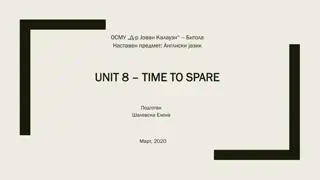Dos & Don'ts: Traffic Signs and Modal Verbs
Learn the meaning of traffic signs and practice using modal verbs in this English lesson. Improve your reading, listening, and writing skills.
8 views • 33 slides
Understanding Language Syntax Through Syntax Trees
Explore how both programming languages and spoken languages can be parsed into syntax trees, revealing the syntactic structure of sentences. Learn about terminals and non-terminals in syntax trees and how they represent different components of language. Dive into syntax tree abstraction for a deeper
3 views • 32 slides
MAKING RECOMMENDATIONS
Providing recommendations is a crucial skill in both spoken and written English, especially for tasks like formal essays, reports, proposals, and letters. This guide covers different ways to give recommendations using modal verbs, passive voice, gerunds, and more. Get insights on modal/semi-modal ve
5 views • 16 slides
Understanding Modal Verbs in English
Modal verbs, also known as modals, are auxiliary verbs that express attitudes and levels of certainty in English. They serve various purposes, such as indicating certainty, ability, permission, and making requests. Modal verbs like can, could, may, might, will, would, must, shall, should, and ought
0 views • 19 slides
Understanding Modal Verbs: Epistemic and Deontic Uses
Modal verbs, such as can, could, may, must, will, and should, play a crucial role in expressing modality in English. This content discusses the epistemic and deontic uses of modal verbs, illustrating how they convey likelihood, ability, permission, suggestions, obligations, and advice. Explore the n
0 views • 34 slides
Understanding Intermodal Transport Operations in Supply Chains
Explore the interrelationship of transportation services, multi-modalism, and safety legislation in the field of transport operations, referencing a comprehensive learner's guide. Topics covered include seamless supply chains, modal options, safety legislation, modal movement requirements, and more.
1 views • 14 slides
Understanding Modal and Imperative Verbs: Usage and Examples
This content covers the explanation and examples of modal verbs, which express certainty, possibility, and obligation, as well as imperative verbs that denote commands and orders. Learn to identify and use these verb types accurately and creatively through practical examples and engaging activities.
1 views • 12 slides
Optimizing Passenger Experience with Advanced Cruise Ferry Solutions
The cruise ferry industry is evolving rapidly, driven by technological advancements and growing passenger expectations. To stay competitive, operators must focus on enhancing passenger experience through innovative solutions. Revenue Technology Servi
1 views • 6 slides
Getting Started with C++ Programming at Room B27 Terminals
This tutorial, led by Brian Gregor from Research Computing Services, introduces C++ programming in Room B27. It covers logging in with BU usernames and providing alternate logins for non-BU users. The tutorial provides key details for accessing the terminals and includes essential information for be
5 views • 48 slides
Enhancing Rail Security in the European Union
Explore the latest updates on EU rail security, including discussions on counter-terrorism measures, consultations for improving passenger security, cybersecurity concerns, and a toolkit for protecting Multi-Modal Passenger Terminals (MMPT). The presentation covers recent terrorist attacks in Europe
4 views • 23 slides
Understanding English Modal Verbs: A Visual Guide
Explore the world of English modal verbs through engaging infographics covering must, can, may/might, could, and should. Learn about their usage in sentences and grasp the nuances of expressing ability, permission, obligation, and possibility. Dive into the explanations with visual aids depicting sc
0 views • 33 slides
Understanding Modal Verbs in English Grammar
Explore the nuances of modal verbs in English grammar through opinion, advice, and exercises. Learn how to use modal verbs like should, ought to, can, must, and may in present and future contexts. Enhance your language skills with examples and exercises highlighting the correct usage of modal verbs.
0 views • 12 slides
Top Maritime Violations FY 2017-2020: Shipyard Employment, Marine Terminals
The top violations in maritime industries from FY 2017-2020, focusing on Shipyard Employment (29 CFR 1915) and Marine Terminals (29 CFR 1917). Key areas include confined spaces precautions, guarding deck openings, PPE requirements, toxic substances control, scaffold safety, and more.
0 views • 10 slides
Modal Verbs Exercise - Can and Can't Practice Activities
Enhance students' ability to use modal verbs can and can't through engaging exercises focusing on forming questions and short answers. Utilize the provided images to prompt students to complete sentences and questions with appropriate modal verbs.
0 views • 5 slides
Safety Information and Resources for Passenger Carriers
Federal Motor Carrier Safety Administration (FMCSA) provides educational resources for passenger carriers to enhance safety and regulatory compliance. Topics include emergency exits, seat belt use, passenger safety instructions, and presentation methods. Following these resources aids in promoting s
0 views • 14 slides
Overview of Sacred Music: Plainchant, Gregorian Chant, and Modal Music
Delve into the world of sacred music with a focus on Plainchant, Gregorian Chant, and Modal Music. Explore the history, characteristics, and unique features of these musical forms, ranging from the reverent tones of Salve Regina to the intriguing melodies of Modal Music. Discover the textures, moods
0 views • 10 slides
Safety Requirements for Maritime and Inland Waterway Terminals
This rule outlines the HSE requirements for managing risks during the loading, unloading, and bunkering of vessels with dangerous liquid bulk cargoes at maritime or inland waterway terminals. It covers risk identification, control measures, training, emergency response planning, and event reporting,
0 views • 20 slides
Managing Belief Annotations in Databases: A Modal Logic Approach
Explore the concept of belief databases that enable data curation based on modal and default logic in a relational model. The work discusses managing inconsistent views in community databases and presents a motivating application scenario to illustrate the challenges and solutions in handling belief
0 views • 34 slides
Understanding Modal Verbs for Ability, Obligation, Prohibition, and Advice
Modal verbs play a crucial role in expressing ability, obligation, prohibition, and advice in English. They help convey various nuances in meaning such as capability, necessity, restrictions, and suggestions. By exploring modal verbs like "can", "could", "must", and others, you can develop a deeper
0 views • 9 slides
WMATA RFP CQ18193/ST - Digital Wall Scapes & Display Terminals Pre-Proposal Meeting
WMATA is seeking qualified contractors to design, fabricate, and install integrated digital wall scapes and display terminals at various metro station locations. The scope of work includes creating interactive display units for maps, news, information, and advertising. Contractors are encouraged to
0 views • 24 slides
Power System Dynamics and Stability: Modal Analysis and PSSs
This lecture discusses modal analysis and Power System Stabilizers (PSSs) in power system dynamics and stability, covering topics such as eigenvalue calculations, generator models, and exciter effects. Key papers and examples are provided to enhance understanding and application in power systems eng
0 views • 27 slides
Multimodal Semantic Indexing for Image Retrieval at IIIT Hyderabad
This research delves into multimodal semantic indexing methods for image retrieval, focusing on extending Latent Semantic Indexing (LSI) and probabilistic LSI to a multi-modal setting. Contributions include the refinement of graph models and partitioning algorithms to enhance image retrieval from tr
1 views • 28 slides
Framework for Combatting Importation of Counterfeit Terminals in EACO Member States
This framework presentation by Mwende Njiraini from the Communications Authority of Kenya focuses on the definitions of counterfeit and substandard terminals, their impacts on industry, consumers, and governments, as well as proposed practical measures to combat the issue. It addresses challenges su
0 views • 26 slides
Performance Aspects of Multi-link Operations in IEEE 802.11-19/1291r0
This document explores the performance aspects, benefits, and assumptions of multi-link operations in IEEE 802.11-19/1291r0. It discusses the motivation for multi-link operation in new wireless devices, potential throughput gains, classification of multi-link capabilities, and operation modes. The s
0 views • 30 slides
Multi-Stage, Multi-Resolution Beamforming Training for IEEE 802.11ay
In September 2016, a proposal was introduced to enhance the beamforming training procedures in IEEE 802.11ay for increased efficiency and MIMO support. The proposal suggests a multi-stage, multi-resolution beamforming training framework to improve efficiency in scenarios with high-resolution beams a
0 views • 11 slides
Panasonic KX-NTV150/160 IP Voice Terminals: Specifications Overview
The Panasonic KX-NTV150/160 IP Voice Terminals are advanced communication devices equipped with cameras and various features. They operate as SIP extensions in a Panasonic PBX system, offering video and audio communication capabilities, camera control functionalities, and multiple connection options
0 views • 32 slides
Understanding Modal Verbs in Grammar - Mega Goals 6 Unit 1 Everyone Makes Mistakes
Modal verbs play a crucial role in expressing abilities, possibilities, and obligations in English grammar. This lesson from Mega Goals 6 Unit 1 covers modal verbs, passive voice, and past models, offering a comprehensive overview through various activities and examples.
0 views • 25 slides
Understanding Modal Testing and Analysis in Structural Dynamics
Modal testing and analysis play a crucial role in understanding the behavior of structural systems under various conditions like undamped, viscously damped, and hysterically damped scenarios. This analysis involves the study of single-degree-of-freedom systems, undamped systems for free and forced v
0 views • 23 slides
Neural Network for Car-Passenger Matching in Ride-Hailing Services by Karim Akhnoukh
In his M.Sc. thesis, Karim Akhnoukh explores the use of a neural network for car-passenger matching in ride-hailing services. The research delves into solving complex optimization problems related to vehicle routing and passenger matching using innovative algorithms. The study showcases the applicat
0 views • 33 slides
Understanding Modal Verbs: Usage and Examples
Modal verbs are auxiliary verbs that are used in conjunction with main verbs to express various meanings such as possibility, likelihood, necessity, and more. Common modal verbs include may, must, could, should, and will. They play a crucial role in indicating the level of certainty or permission in
0 views • 16 slides
Understanding Modal Verbs in English
Modal verbs in English such as 'must', 'have to', 'mustn't', and 'don't have to' are used to express obligations, prohibitions, and lack of necessity. 'Must' and 'have to' convey internal and external obligations, while 'mustn't' indicates prohibition and 'don't have to' implies lack of necessity. E
0 views • 14 slides
Benchmarking UN/EDIFACT Standard in Port Terminals
Explore the benchmarking of UN/EDIFACT standard in port terminals through a series of images capturing key aspects such as migration, benefits, scope, and operational processes. Discover the challenges and benefits of implementing UN/EDIFACT guidelines in terminal operations.
1 views • 35 slides
Exploring Different Means of Transport and Improving Passenger Experience
Discover various modes of transportation and their pros and cons for both short and long distances. Learn how to enhance passenger comfort during journeys by air, rail, sea, and coach. Expand your transport-related vocabulary and write an engaging account of a multi-transport trip using selected ter
0 views • 20 slides
In-Service Performance Evaluation of Crash Cushions and Guardrail Approach Terminals
In-Service Performance Evaluations (ISPE) assess the safety performance of crash cushions and guardrail approach terminals installed on roads. This evaluation involves data gathering and analysis in collaboration with various offices to ensure road safety. The FHWA recommendation prompted the initia
0 views • 21 slides
Stagecoach East Northstowe Community Forum November 2022 Update
In November 2022, Stagecoach East provides an overview of passenger numbers, impacts of COVID restrictions and Storm Eunice, and comparisons to pre-COVID averages. The organization details route reviews with local authorities, categorization of routes as green, amber, or red, and efforts to address
0 views • 7 slides
Gate Scheduling at Airports: Optimization and Solutions
Allocating gates efficiently at airports is crucial for managing air traffic. Gate scheduling involves assigning flights to stands while considering constraints and objectives like minimizing un-gated activities and passenger walking distance. Various methods such as linear programming, heuristics,
0 views • 11 slides
Overview of DICOM WG21 Multi-Energy Imaging Supplement
The DICOM WG21 Multi-Energy Imaging Supplement aims to address the challenges and opportunities in multi-energy imaging technologies, providing a comprehensive overview of imaging techniques, use cases, objectives, and potential clinical applications. The supplement discusses the definition of multi
0 views • 33 slides
Understanding LL(1) Grammars and Computing First & Follow Sets
Exploring LL(1) grammars and the computation of First and Follow sets for non-terminals. This involves defining FIRST(.) as the set of tokens that appear as the first token in strings derived from a non-terminal and FOLLOW(A) as the terminals that can appear immediately to the right of A in the sent
0 views • 33 slides
Understanding Multi-Modal Transportation in Logistics
The content covers concepts such as inter-modal and multi-modal transportation, seamless supply chains, standard containers, swap bodies, cellular container ships, and unaccompanied road semi-trailers in the context of transportation operations. It explains the meanings and functions of various mode
0 views • 14 slides
Effective Language Learning: Vocabulary, Grammar, and Modal Verbs Activities
Enhance your language skills with engaging vocabulary exercises, definitions matching, and practice with modal verbs. Dive into a variety of educational tools, improve your understanding with video explanations and PDFs, and master different types of present modal verbs. Elevate your language learni
0 views • 16 slides

